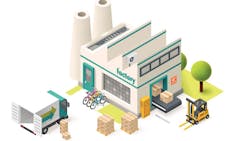How Economic Public Policy Fails US Manufacturers
This is what really aggravates me. People who don't "get" manufacturing who expound on what manufacturing will look like in the future.
They've parachuted in, talked to a handful of manufacturers and produced the "Oh Golly Gee Whiz: The U.S. Still Manufactures [insert basic product here]!" report.
Then they explain the economic "realities" and proceed to say: "but that's not what U.S. manufacturing will look like in the future."
Hogwash!
U.S. manufacturing will look like what WE decide it should look like in the future. No more, no less.
And please, don't talk to me about basic economics and the mythical "invisible hand" that inevitably directs some perfect evolutionary change—unless you're prepared to explain how the laws, regulations, treaties and any number of human interventions in the economy are invisible.
Sorry, but this tirade is courtesy of a series of manufacturing-in-America reports by general news and business publications in the last year or two. First, manufacturing became interesting to them when they realized—shocking news!—that manufacturing lead us out of the most recent recession. More recently, it's to bemoan the lost and never returning low-skilled manufacturing jobs.
… please, don't talk to me about basic economics and the mythical "invisible hand" ...
The radio-show snippet that lodged in my mind comes from a special series, "American Made: The New Manufacturing Landscape," which aired on NPR in late 2014. Commenting about family-owned manufacturing companies, the reporter said:
… that's a huge part of American manufacturing. I live in New York City, and I love going to factories in Brooklyn, Queens, the Bronx. And they're almost always that -- a smallish, family-owned business that's using machinery. I mean, there's this pencil manufacturer right across the Hudson in Jersey City, New Jersey, that is still benefiting from the big upgrade in 1904 to their, like, 1889 machinery, called General Pencil. But that is a different -- I have to say that's a different model. It's more like the corner store. It's more like a mom-and-pop business where, you know, the building's paid off, the machinery is paid off. The company might not in a technical way really be profitable. There's probably a much more profitable use selling off that stuff and, you know, certainly in the New York City area turning it into housing or something. But you have a family that just wants to stick to their knitting.
That is not -- it's a wonderful thing. I'm glad it exists. It provides stability, I would guess, for hundreds of thousands, if not millions of Americans. But it's not where we're going to grow or create lots of new opportunities. It's based on the idea that if your grandpa bought a bunch of machinery and paid it off 50 years ago, you can kind of keep floating along. But that's a different thing from, hey, I'm going to get investors to give me $100 million so I can start a new factory and really make a go of some huge profits. That's a totally different animal.
Really. Here's a manufacturing situation that "provides stability, I would guess, for hundreds of thousands, if not millions of Americans," and someone has the nerve to say "there's probably a much more profitable use selling off that stuff… and turning it into housing or something."
That pretty much sums up what the majority of economic policy leaders think about manufacturing, and, more importantly, what drives their policy.
It also sums up what is wrong with U.S. manufacturing.
Now, how do we fix that?
About the Author
Patricia Panchak
Patricia Panchak, Former Editor-in-Chief
Focus: Competitiveness & Public Policy
Call: 216-931-9252
Follow on Twitter: @PPanchakIW
In her commentary and reporting for IndustryWeek, Editor-in-Chief Patricia Panchak covers world-class manufacturing industry strategies, best practices and public policy issues that affect manufacturers’ competitiveness. She delivers news and analysis—and reports the trends--in tax, trade and labor policy; federal, state and local government agencies and programs; and judicial, executive and legislative actions. As well, she shares case studies about how manufacturing executives can capitalize on the latest best practices to cut costs, boost productivity and increase profits.
As editor, she directs the strategic development of all IW editorial products, including the magazine, IndustryWeek.com, research and information products, and executive conferences.
An award-winning editor, Panchak received the 2004 Jesse H. Neal Business Journalism Award for Signed Commentary and helped her staff earn the 2004 Neal Award for Subject-Related Series. She also has earned the American Business Media’s Midwest Award for Editorial Courage and Integrity.
Patricia holds bachelor’s degrees in Journalism and English from Bowling Green State University and a master’s degree in Journalism from Ohio University’s E.W. Scripps School of Journalism. She lives in Cleveland Hts., Ohio, with her family.


